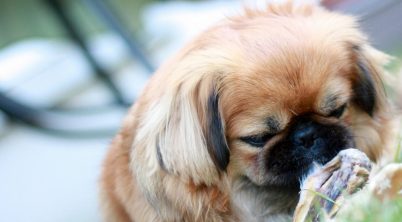The phenomenon of dogs eating feces, known scientifically as coprophagia, is not uncommon, and the Pekingese breed is no exception. This behavior may be off-putting to pet owners but it has roots in the animal’s nutrition-seeking instincts and habits. Understanding why a Pekingese might engage in this behavior is key to addressing it.
Nutritional deficiencies, environmental stressors, or behavioral issues can all lead to a Pekingese showing interest in consuming stool. For this toy breed, which can be prone to specific health issues, ensuring a diet rich in all the necessary nutrients is crucial. Analyzing the dog’s environment and routine is just as important to rule out any influences that could trigger coprophagia.
With a confident grasp of canine behavior, owners can look for signs indicating whether the Pekingese’s coprophagia is a temporary issue or a sign of an underlying problem. Addressing the behavior involves a combination of dietary management, environmental enrichment, and consistent training to discourage the habit and maintain optimal health and hygiene for the Pekingese.
Table of Contents
Understanding Coprophagia in Pekingese
The Pekingese, a toy dog breed with a regal history, is not exempt from a behavior known as coprophagia. This involves the ingestion of feces, a behavior that can have various triggers and potential health consequences for these small canines.
Reasons for Poop Eating
- Stress: Pekingese may eat feces due to stress, which could stem from environmental changes or a lack of adequate socialization and training.
- Boredom: Limited physical exercise and mental stimulation can lead to this undesired behavior.
- Nutritional Deficiency: Improper diet or malabsorption issues may drive a Pekingese to seek out feces as a source of missed nutrients.
- Health Conditions: Certain illnesses, such as intestinal parasites, can increase the propensity to engage in coprophagia.
Health Concerns and Symptoms
- Bacterial Infections: Feeding on feces might expose Pekingese to harmful bacteria, risking conditions such as diarrhea or vomiting.
- Parasitic Infections: Consumption of contaminated feces can lead to parasites like roundworms or hookworms.
- Physical Indicators: Signs of poor health due to coprophagia include weight loss, lethargy, or changes in appetite.
By understanding the causes and recognizing the signs, Pekingese owners can address coprophagia effectively to ensure the health and well-being of their pets.
Nutritional Needs of Pekingese
Pekingese dogs require a balanced diet that is rich in proteins, fats, and essential nutrients, including vitamins and minerals, to maintain their health and vitality.
Balanced Diet Essentials
A Pekingese’s diet must provide a balance of the primary nutritional components to support their overall well-being. These components include:
- Carbohydrates: Supply energy and come from sources like brown rice and sweet potatoes.
- Proteins: Critical for muscle maintenance and overall growth.
- Fats: Provide energy and help with nutrient absorption.
- Fibers: Important for digestive health.
- Water: Essential for hydration.
Proteins and Fats in Diet
The protein and fat content in a Pekingese’s diet are particularly important. Proteins should come from high-quality animal sources:
- Chicken
- Fish
- Lamb
For fats:
- Healthy oils like flaxseed, which contain omega-3 and omega-6 fatty acids.
- Moderate fat levels are crucial to avoid obesity, especially given the compact size and slower metabolism of Pekingese.
Vitamins and Minerals
Vitamins and minerals are essential for a Pekingese’s diet, each fulfilling critical physiological functions:
- Calcium: For strong bones and teeth.
- Iron: For healthy blood.
- Zinc: Important for skin health and immune function.
A well-balanced commercial dog food will typically include the necessary vitamins and minerals, but supplements can be considered if recommended by a veterinarian. Fresh fruits and vegetables can provide additional vitamins and antioxidants.
Health Problems Leading to Unusual Eating Habits
Changes in a Pekingese’s eating habits, such as consuming feces, may signal underlying health issues. These can range from digestive system complications to food intolerances, each presenting its own set of challenges.
Digestive System Issues
Digestive problems in Pekingese can provoke atypical eating behaviors like coprophagia, which is the consumption of feces. Common digestive issues include:
- Diarrhea and Vomiting: These symptoms can result from infections caused by intestinal parasites or gastrointestinal diseases. Compromised digestion might lead a dog to seek out feces as an instinctive attempt to replenish a perceived lack of nutrients.
- Diabetes: A dog with diabetes may eat feces due to malabsorption of nutrients or increased appetite.
- Obesity: Though not directly linked to feces eating, obesity signifies a nutritional imbalance which could disrupt normal eating patterns.
Food Allergies and Intolerances
Food allergies and intolerances in Pekingese can cause discomfort and may lead to consuming feces due to the associated gastrointestinal upset.
- Identifying an Allergy: Symptoms such as itchy skin or gastrointestinal disturbances (e.g., diarrhea) could mean a food allergy is present.
- Intolerances: Dogs with intolerances may suffer from vomiting and diarrhea after eating certain foods, which might compel them to eat feces to soothe their discomfort or due to malnutrition caused by poor absorption of nutrients.
Behavioral and Environmental Factors
Pekingese dogs may exhibit the behavior of eating poop due to various behavioral and environmental factors. This section explores the impact of stress and anxiety, as well as the influence of other animals on this particular behavior in Pekingese.
Stress and Anxiety in Pekingese
Changes in a Pekingese’s environment or routine can induce stress and anxiety, which may lead to unusual behaviors such as eating feces. Stress can manifest through behavioral changes like increased lethargy or anxiety. A Pekingese might react to stressors by engaging in comfort-seeking behaviors, which oddly enough, can include consuming feces. Addressing the root of this anxiety — whether it’s due to a move, the loss of a companion, or a disrupted daily routine — is key to modifying this behavior.
Influence of Other Animals
The presence of other animals can also influence a Pekingese’s behavior. Pekingese are known for their loyal and affectionate nature towards their family, which can be disrupted by the introduction of new pets. They may feel the need to assert dominance or respond to competition over resources. This might lead to mimicking behaviors, including eating poop if other animals in the household display this habit. It is also possible for a Pekingese to adopt this behavior as a response to seeing other animals do it, believing it to be an acceptable action.
Preventive Measures and Solutions
To address the issue of a Pekingese eating poop, owners can employ dietary adjustments that satisfy nutritional needs and training techniques to modify the unwanted behavior.
Dietary Adjustments
Probiotics: Introducing probiotics into the Pekingese’s diet can improve gut health, potentially reducing the urge to consume feces. Probiotics aid in digestion and the absorption of nutrients, which may be lacking in the dog’s current diet.
Well-balanced Meals: Ensure the Pekingese has a well-balanced diet rich in essential nutrients. A diet lacking in certain nutrients may lead a dog to eat poop to compensate for these deficiencies.
Training and Behavior Modification
Positive Reinforcement: When the Pekingese performs favorable behaviors, such as ignoring feces, owners should reward these actions. Rewards can include treats, praise, or playtime.
Consistent Exercise: Regular exercise can help to reduce boredom and anxiety, which are potential contributors to poop-eating behavior. A structured exercise regimen can engage the Pekingese’s mind and body, reducing the likelihood of such behaviors.
Correction Without Punishment: If the dog attempts to eat feces, owners should correct the behavior without resorting to punishment, which can be counterproductive. Instead, actions should be redirected to a positive activity or command.








